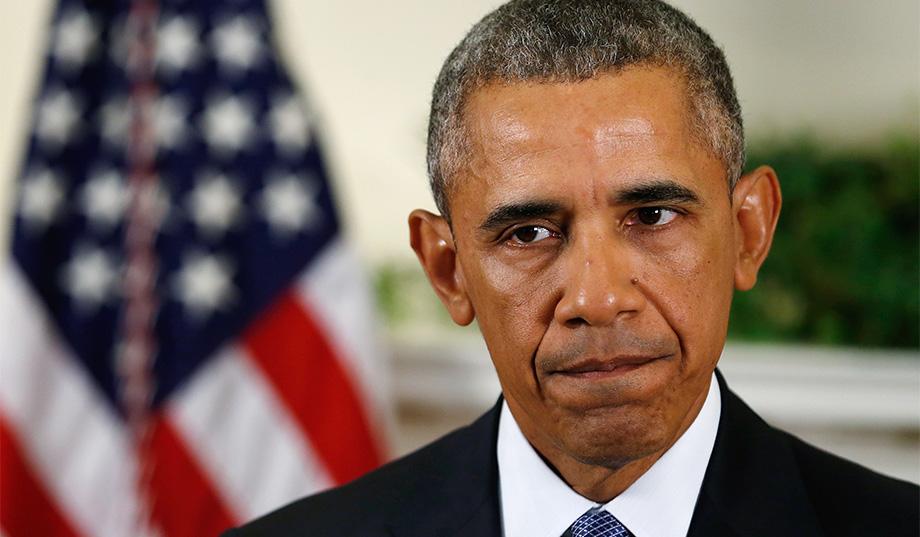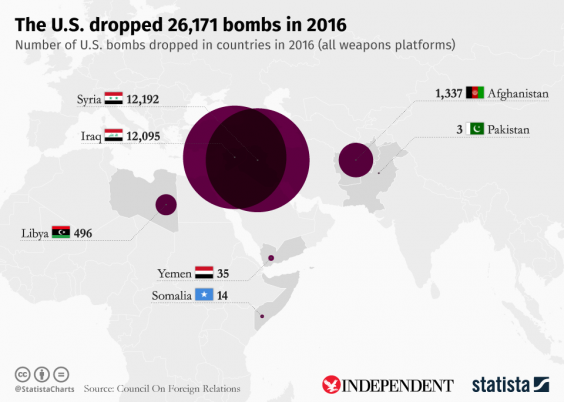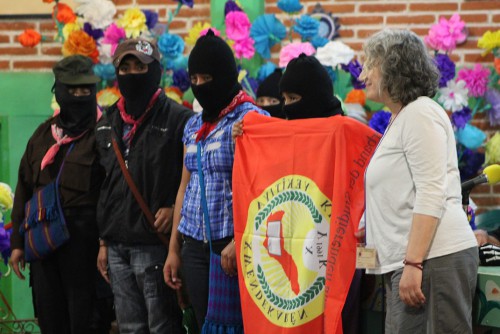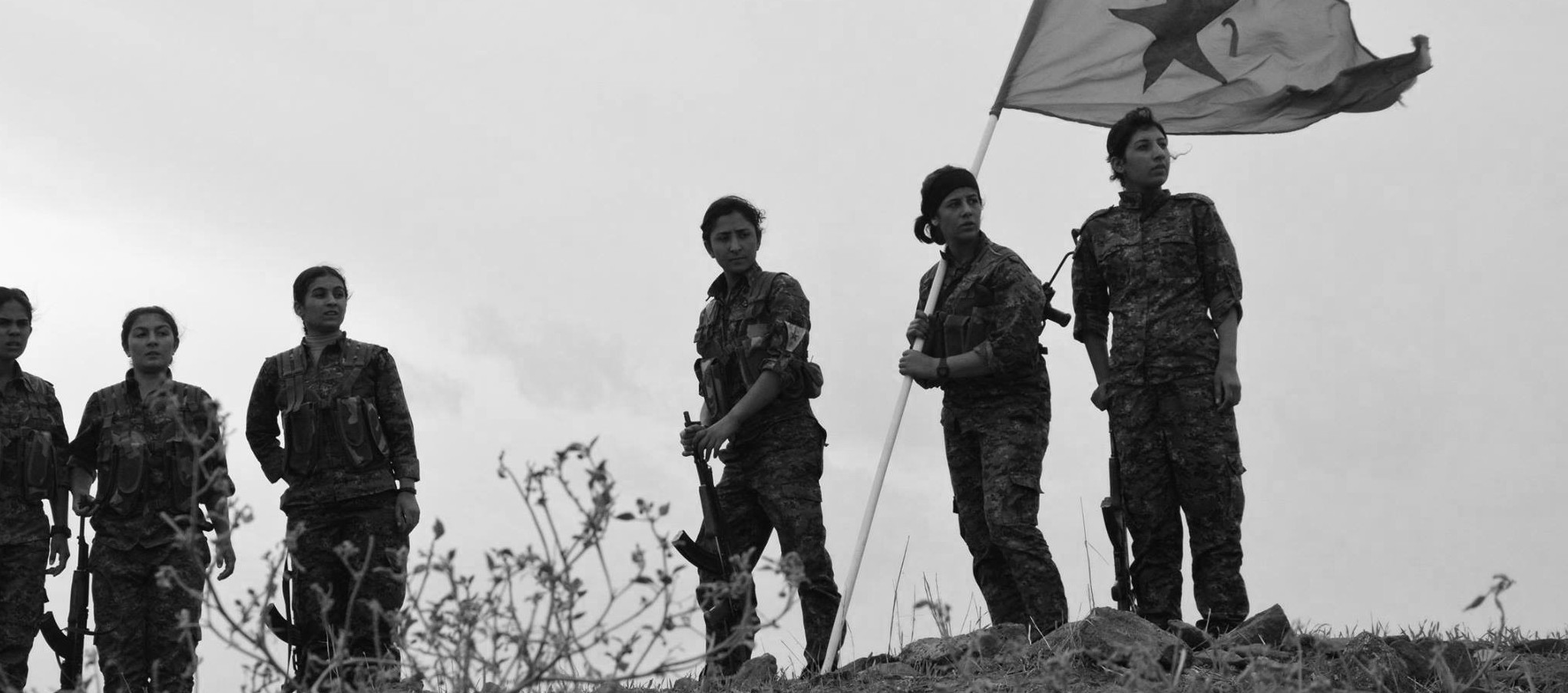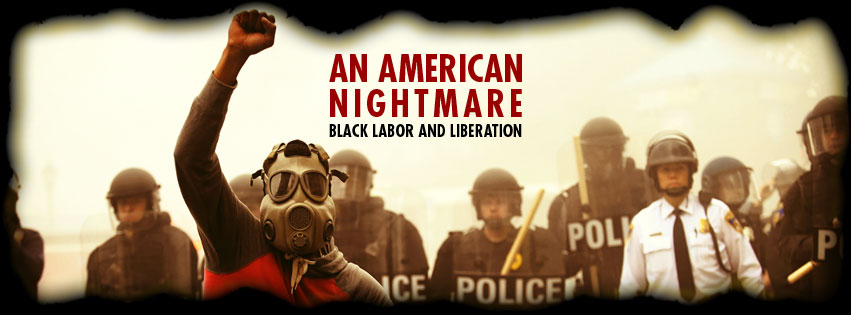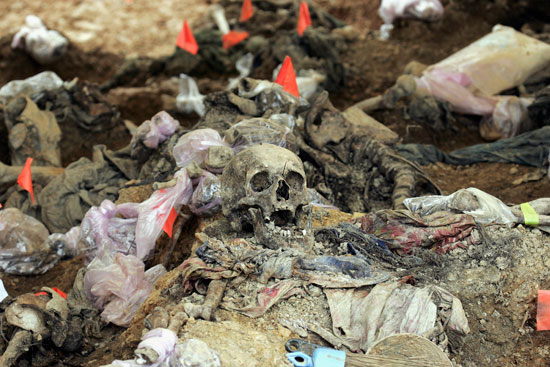Este artículo fue publicado originalmente el 20 de octubre de 2016 en La Jornada.
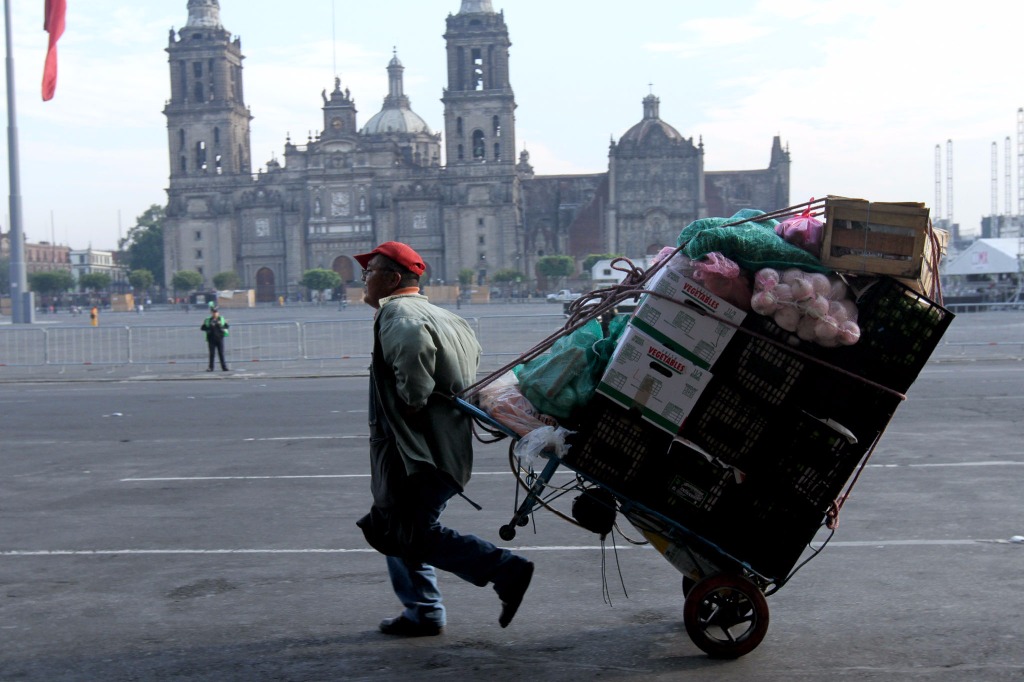
Escena cotidiana en el Zócalo capitalino. Foto María Meléndrez Parada.
El sistema de dominación y acumulación en que vivimos -conocido como capitalismo- tiene como atractor principal: la acumulación de poder y riquezas. En su comportamiento actual, para lograr sus fines el sistema emplea todos los modos de producción que lo precedieron. Combina el trabajo asalariado con el esclavismo, y uno y otro con el trabajo del siervo y con las nuevas formas de tributación y despojo, que hoy se ocultan en deudas impagables y réditos usureros, que los acreedores cobran con bienes y territorios por las buenas o por la fuerza.
A los países endeudados, cuando les llega la hora de pagar y no tienen con qué, los hacen acumular deuda sobre deuda y pagar más y más intereses hasta que por fin los embargan y los obligan a desnacionalizar y privatizar propiedades nacionales y estatales… es decir, los despojan. Esa es la nueva acumulación primitiva o por desposesión en una de sus muchas variantes. Todo ocurre en un conocido proceso por el que los gobiernos deudores someten sus decisiones, su dignidad y sus políticas a las corporaciones y complejos acreedores, que son quienes realmente mandan.
Los políticos colaboracionistas creen que ser un buen político es obedecer a esos que mandan, es enriquecerse con los que mandan, y es llegar a ser como los que mandan. Piensan que así es la vida, y hasta dicen y se dicen, que la historia también es así, y que quienes no entienden los cambios actuales se están aferrando a un pasado que ya no existe, y se ocultan los avances con sus necios prejuicios.
Piensan también que en este mundo, aunque no lo digamos, todos somos sinvergüenzas, pero que ellos -los políticos distinguidos, y que mandan queramos o no- son más inteligentes y eficaces que quienes los critican. Ganas tuvieran sus opositores de ser como ellos. Así piensan.
Todo lo anterior parecería anecdótico si no sirviera para darnos cuenta que la crisis que vivimos es una crisis económica, moral, intelectual, política y social. Es una crisis que abarca todas las actividades de la vida humana, incluso las del conocimiento de lo que pasa y de lo que va a venir en el mundo y el país, en que sus trabajadores de tierra, mar y aire, sus campesinos, agricultores y mineros, sus comunidades indígenas y no indígenas, sus sectores medios y sus juventudes, tendrán más posibilidades de defenderse, y de ganar, si a una organización de organizaciones sectoriales, regionales, fabriles, comunales, barriales, añaden la organización desde abajo y con los de abajo de su voluntad colectiva y personal; la organización de su conocimiento y del saber, la organización de su conciencia para mejor lograr lo que los trabajadores y los pueblos quieren, y para impulsar -lo que es fundamental- el fortalecimiento y organización de nuestra moral de lucha, de nuestra moral de cooperación, de compañerismo, y, también, de concertación de voluntades tanto para resistir, como para luchar, y construir las relaciones y estructuras de otro mundo posible y necesario en que, con la democracia -como poder del pueblo- este organice la vida y el trabajo para alcanzar esa emancipación, esa libertad y ese respeto a las diferencias de raza, edad, sexo, religión, filosofía, para las que la humanidad dispone hoy de conocimientos y técnicas que consoliden la emancipación humana.
Si los sueños del pasado se quedaron en sueños -y los sueños, sueños son-, hoy, con las técnicas de organización de que disponemos y una fuerte moral colectiva, se pueden realizar, si no cejamos en nuestra decisión de lucha y nos organizamos en redes, en coordinadoras, en colectividades, en comités de fábrica, de barrio, de calle y en otros enlaces presenciales y a distancia, que constituyan un nuevo tipo de partido capaz de construir las bases de otro mundo posible.
Hoy podemos hacer que nuestra lucha solidaria de pueblos y trabajadores viva ese paso de lo ideal que se vuelve real. Sí se puede, aunque estemos en plena tormenta, o por eso mismo.
La crisis en que vivimos es una crisis que rompe muchas de las tendencias que se daban, en particular las que buscan su solución dentro del actual sistema de dominación y acumulación capitalista, con sus mentirosos actos caritativos, generosos, humanitarios, y hoy, hasta dizque para salvar la tierra que ellos mismos están destruyendo con su entrañable codicia.
Las grandes crisis de este sistema de dominación y acumulación movido por el afán de poder, de riquezas y utilidades no sólo obedecen a que baja la tasa de utilidades de las compañías, o a que hay problemas de sobreproducción o de subconsumo. No sólo se deben a especulaciones de unos cuantos banqueros que quiebran a miles de deudores, como la crisis que se desencadenaron en 2008 y que sirvió de detonador de la que el mundo todavía no sale.
Las crisis se producen también deliberadamente por las corporaciones financieras para maximizar su poder, sus riquezas y utilidades, para debilitar a los trabajadores y hacerlos que pierdan sus derechos y bajen la fuerza de sus demandas y, que hasta para comer se sometan a toda suerte de tiempos, ritmos, riesgos, salarios de hambre, enfermedades seguras, y daños incurables.
Las crisis inducidas sirven a la vez para que las grandes corporaciones hagan negocios a costa de medianas y pequeñas empresas, y hasta de países a lo que sacan fuera de los mercados nacionales e internacionales, o a los que entre deudas, presiones y colusiones someten, suplantan o integran a sus propias compañías privadas -como es el caso del petróleo mexicano-, o de inmensas regiones del territorio nacional que pasan y pasarán a ser “enclaves coloniales”.
Las crisis inducidas se enfocan también contra los servicios públicos que los grandes capitales quieren privatizar a toda prisa, o en incesantes acometidas, como ocurre con las universidades, los hospitales, las pensiones… y con la educación toda, que buscan desmoronar para transformarla en negocios de unos cuantos.
En los servicios públicos codiciados incluyen hasta las pensiones y jubilaciones y el conjunto de la seguridad social. Todas esas actividades en vez de ser una carga fiscal aumentan sus haberes y poderes. Así como patrones de la educación forman estudiantes mental y materialmente eficaces y eficientes para los servicios que requieren, y como patronos de los hospitales estimulan tratamientos y medicamentos que duran tanto como lo que permiten los recursos y seguros de los clientes…
Empeñados en tan fieros empeños, los grandes patrones ni por asomo piensan en las personas a las que despojan y ponen en la calle, sanos o enfermos, y que de la noche a la mañana se quedan sin recursos para sus gastos elementales de salud, educación, pensiones, producción, comunicación, servicios, alimentación y hasta de agua para beber.
Es más a quienes se vuelven vendedores de la calle, cuidadores de automóviles, boleros, plomeros, relojeros les quitan sus trabajos con persecuciones de la policía o con productos que ya no tienen compostura, o que “compactos” salen de las grandes fábricas y cuando una pieza no sirve se van a la basura.
La variada ofensiva afecta a grandes y pequeños países, campos y ciudades, montes y lagos; ríos y mares; suelos y subsuelos lo cual significa una creciente disminución de los empleos y de las fuentes de trabajo, medidas a las que acompañan con macropolíticas de represión y corrupción que no sólo incluyen la violación de los derechos nacionales sobre el territorio, la población, la soberanía, sino los derechos humanos que ellos mismos dicen defender y que de por sí ya están muy limitados.
Entre sus agresiones destaca el incesante ataque a los derechos agrarios de las comunidades, y el despojo por narcos y mafiosos de los recursos y las tierras de ejidatarios, comuneros y pequeños propietarios. La ofensiva no sólo incluye los derechos sociales y los de agricultores y campesinos sino los derechos sindicales, y los derechos ciudadanos. Es más a la devaluación de la moneda, a la inflación creciente que prepotentemente juraron controlar, añaden la congelación de salarios en moneda y especie, o en servicios y mercados antes subsidiados y hoy desaparecidos o por desaparecer, a favor de las megaempresas que todo lo producen y todo lo venden, hasta las semillas de que la vida no nace, y los remedios que desatan pandemias.
Mientras eso y más ocurre -y al mismo tiempo- los hacedores de tanto daño se pasean y pavonean haciendo como que son grandes señores, respetables funcionarios, responsables y seguros empresarios, eficientes y eficaces hombres de Estado. A su pública apariencia añaden un doble teatro que también pone en crisis la realidad. Desapareciéndola… ¡La realidad no aparece!
De un lado si el éxito de la dominación en crisis se debe a la cooptación y colusión de cuadros y clientelas subordinadas y subrogadas que circulan a través de todo el sistema gubernamental abierto y encubierto, de otro se debe al arte maravilloso de la televisión, de la propaganda a la sociedad de consumo, combinada con mezclas, alianzas y amalgamas de una macropolítica de corrupción y represión que funciona desde los grandes mandos de la globalización neoliberal y “desde la sombra” hasta los gobiernos y grupos criminales abiertos y encubiertos que juegan sus respectivos papeles entre autonomías y sujeciones, entre soberanías y servidumbres, amalgamadas o coludidas.
Con razón muchos autores no sólo hablan de una crisis del capitalismo sino de una crisis de la civilización. Algo de eso es lo que está pasando aquí y en el mundo que domina el complejo empresarial-militar-político y mediático de Estados Unidos y de la Unión Europea, con sus redes de aliados, socios y subordinados de una globalización que se distingue de la política imperialista anterior, por lo menos en dos terrenos: Uno consiste en que más que dominar a los Estados-nación desde un centro rector, las sedes imperiales están organizando una burguesía global, cuyos enlaces consolidados reciben el apoyo necesario para enriquecerse y acumular, siempre que del ingreso nacional total, las corporaciones se queden con la mayor parte. A esas medidas que organizan la lucha de clases global, quienes de veras mandan añaden otras por las que regularmente dominan a sus socios periféricos. Consisten estas en darles “luz verde” en la corrupción y la represión, una corrupción y represión de las que se benefician en grande las metrópolis y que la banca mundial oculta, cuando en realidad son ellas y ella quienes hacen del narcotráfico y el terrorismo uno de los principales negocios del “enlace globalizador” de las corporaciones financieras, armamentistas, mineras, agroindustriales, constructoras, y de los variados servicios que les dan para la construcción de infraestructuras y meganegocios en las ciudades y territorios de la periferia, al tiempo que los gobiernos nativos adquieren cuantiosas deudas interiores-exteriores, que no destinan al desarrollo del país, sino a la importación de materiales y productos que los prestamistas producen y de que se deshacen en ventas negociadas para el descomunal enriquecimiento y la buena marcha de las corporaciones y sus deudores.
La creciente deuda externa no se emplea así para adquirir bienes de producción que les hagan competencia en medio de la crisis sino para la adquisición de bienes de consumo que las corporaciones no tienen a quien vender.
A tan nuevas y renovadas medidas se añade otra más que es importante señalar y es la que concierne a la organización global de la lucha de clases, que corresponde a la impresionante novedad de los llamados “golpes de Estado blandos” aplicados sobre todo contra los llamados “gobiernos progresistas” o “de izquierda”.
En la lucha global de clases se usan, con beneficios sin cuento, los vínculos entre el crimen organizado y el gobierno local, asesorado e informado este por el gobierno global y apoyados abiertamente por las burguesías nacionales. En la lucha se combinan las guerras “internas”, reales, con las virtuales, con o sin uso de los militares, y mediante la combinación de la inflación con el desabasto, de la publicidad y la propaganda con los agentes provocadores…
La novedad prevaleciente se basa en el uso de las contradicciones de clase de pueblos y trabajadores que tiran a los gobiernos progresistas con el apoyo del poder legislativo y el judicial y a veces con el del segundón en el poder ejecutivo, todo en medio de un ejército que defiende el orden legal existente. La globalización es otro imperialismo, muy otro, en occidente y también en oriente; en el neoliberalismo de aquí y en el estatismo no menos sofisticado de allá.
En cuanto a los gobiernos que luchan eficaz y eficientemente en las redes de lo socios comprometidos y leales, la globalización neoliberal apoya su fidelidad siempre que le den más y más de lo que les piden o que no incurran en desobediencias. En ambos casos se les amenaza con denunciarlos y, si es necesario, cuando ya no le sirven, las propias corporaciones y complejos apoyan las denuncias de latrocinios y crímenes, y les aplican los calificativos de “gobiernos fallidos” o de “gobiernos canallas”. Así es el arte de gobernar “eficientemente”, así se ejerce una llamada “democracia” que ha sido privatizada por las grandes corporaciones y utilizada por clase política para ocupar puestos jugosos de elección popular y disponer de las ventajas y concesiones de que se sirven sus jefes políticos y clientelas.
En México el sistema político, con sus sindicatos y organizaciones del antiguo sector popular, obrero y agrario actúa en un mundo fantasmagórico en que las mutuas acusaciones de corrupción o violencia criminal, individual y colectiva, generalmente son inconsecuentes, y “allí quedan” -en meras denuncias-; mientras los partidos políticos, a más de sus luchas internas y de sus alianzas desideologizadas entre los que se dicen de derecha o de izquierda, más que presentar y defender un programa alternativo socialdemócrata, o reformista, o que retome como programa la Constitución que ya se deshizo, se dedican a acusaciones personales de latrocinios, crímenes, y flaquezas, con un agravante más: Que cuando presentan un programa para la solución de los problemas nacionales y sociales, su candidatos, una vez elegidos casi siempre se olvidan de las promesas, y muestran, con variados tonos, su pobre y elocuente deterioro moral.
En medio de tan grave situación se dan dos circunstancias a nivel mundial que hacen cada vez más necesaria la organización de los pueblos y los trabajadores: La amenaza a la vida en la tierra si el capitalismo subsiste, y el horror sistémico que vive la humanidad con la actual organización del trabajo y de la vida.
Para la solución de todos esos problemas y para el establecimiento de una democracia desde abajo y con los de abajo, el papel de los trabajadores va a ser crucial y a su presencia como actores fundamentales de la emancipación quiero dedicar unas palabras finales, a reserva de referirme en otra ocasión al reciente Congreso Nacional Indígena y del EZLN con su extraordinario acuerdo de consultar a sus comunidades sobre la posibilidad de librar la lucha electoral con todos los mexicanos que se sumen al proceso emancipador, y que para ello funden el poder del pueblo mexicano. Los trabajadores cumplirán en este y en todos los proyectos emancipadores un papel fundamental para su organización y éxito.
De hecho, todos los problemas referidos incluyen la presencia activa de los trabajadores en su sentido más amplio, que es el correcto y, al mismo tiempo hay otros problemas que directamente les conciernen y de que me gustaría hablar, así como, de los retos que se les presentan para una organización y una lucha que pueda hacer el pueblo trabajador, uno de los actores que con sus vanguardias construya la democracia, es decir, la soberanía del pueblo sobre la de monarcas, oligarquías, burocracias y corporaciones.
La crisis está afectando en el mundo y en nuestro país a los trabajadores como a la inmensa mayoría de los seres humanos y amenaza con afectarlos como a todos los seres vivos y al planeta Tierra. Esto es científicamente exacto. Pero por lo que se refiere a los trabajadores, algunos datos y cifras pueden ser muy ilustrativos, y son esenciales para darnos cuenta de la urgente tarea de organizarnos y de las mejores formas de hacerlo.
Empleo un estilo telegráfico para dar cuenta de algunos. Según la Organización Internacional del Trabajo 25 millones de personas son víctimas de trabajo forzado. Según la Walk Free Foundation el número de esclavos en México es de 376 mil 800 personas. Los peligros de desempleo por la robotización y el uso de nuevas tecnologías y de “sistemas inteligentes” varían en las distintas regiones y en una misma región. El riesgo de la automatización del trabajo en los países de la OCDE alcanza 9%. Parece estar subestimado…
Una investigación de la Universidad de Oxford calcula que los trabajos en alto riesgo de perderse alcanzan al 47% en Estados Unidos. En todos estos casos se habla de trabajos que pueden ser automatizados en una década o dos. La mayoría corresponde a transportes, labores de producción y también de trabajo administrativo y de oficina. Otra amenaza más se refiere a los desplazados por la violencia, que según el Consejo Noruego para refugiados en México llegan por lo menos a 281 mil 400 internos con unos que son masivos -es decir de 10 o más familias-, y en que destacaron 15 estados.
De 2007 a 2011 se estima que pasaron a Estados Unidos 115 mil personas de las 254 mil que querían entrar sólo desde Ciudad Juárez.
Como la ayuda a los campesinos ha sido totalmente abandonada de acuerdo con la política neoliberal globalizadora, 11 millones 300 mil mexicanos se encuentran en la extrema miseria, cifra proporcionada por Consejo Nacional de Evaluación de la Política de Desarrollo Social, el Coneval. Entre trabajadores, periodistas, estudiantes, líderes comunales y muchos otros, como víctimas se registran más de 100 mil homicidios intencionales de 2006 a 2012, según el Informe Especial de la ONU sobre ejecuciones extrajudiciales, sumarias o arbitrarias.
Según cifras estimadas de organizaciones de la sociedad civil el promedio anual de migrantes indocumentados que ingresa a México puede llegar a 400 mil. Y hay migrantes que llegan de Asia, África, el Caribe y Sudamérica, que tratan de pasar a Estados Unidos como indocumentados por ciudades del este y el oeste. La emigración actual es inmensa; la del futuro tiende a ser mayor.
No puede uno ignorar que todos estos datos son muy “incómodos” para los ricos y los poderosos y para quienes los encubren y ensalzan, o simplemente, no quieren oír nada del mundo desagradable. Pero son muy importantes para quienes creemos que otro mundo es posible y luchamos poco o mucho para que hasta lo que parece imposible sea posible como decía aquél letrero del 68. Y querríamos terminar este recuento refiriéndonos a los jóvenes que son quienes van a vivir en el futuro inmediato como trabajadores manuales e intelectuales. Sobre todos en ellos pesa el peligro de la privatización de escuelas y universidades.
Al conflicto magisterial que la llamada reforma educativa alentó se añaden crecientes daños y amenazas a las escuelas y universidades públicas. En ambos niveles, niñez y juventud viven problemas que parecen identificarse con una política expresa -y no sólo indirecta- de desarrollo del subdesarrollo. No debemos nada más enfrentar esa política sino acrecentar las fuerzas de pueblos y trabajadores y de las organizaciones que con ellos y para ellos luchan por otra organización del trabajo y de la vida.
Ser trabajador es ser obrero, campesino, empleado, profesor, ingeniero, médico, abogado, y profesionista en el uso de las manos y la inteligencia. Si en los trabajadores productivos se encontró por la teoría crítica al protagonista de la emancipación, la historia fue mostrando varios hechos significativos que es necesario llevar a la conciencia y a la acción. Uno de ellos es que a los trabajadores de la producción industrial se tienen que añadir hoy los de la agricultura, los de las comunidades, los desplazados, los sin papeles y también los de la distribución, los transportes y servicios, así como los trabajadores que viniendo de las clases subalternas y de los sectores medios viven en carne propia y en su conciencia, la irracionalidad de un sistema dominado por quienes están enfermos de poder, utilidades y riquezas, a tal grado que se ocultan el estado universal de barbarie y de inmoralidad que el sistema dominante impone, amenazando hoy la existencia de la propia vida de sus beneficiarios y la de sus descendientes, hechos todos que no son producto de mentes deprimidas a las que acusan de catastrofistas, sino de quienes, junto con los pueblos y los trabajadores organizados en su moral de lucha y de cooperación, lidiaremos y venceremos.
